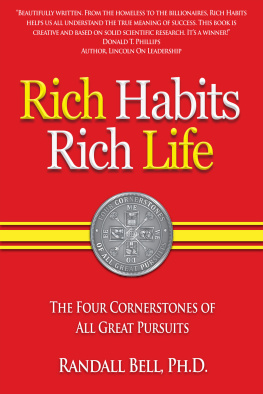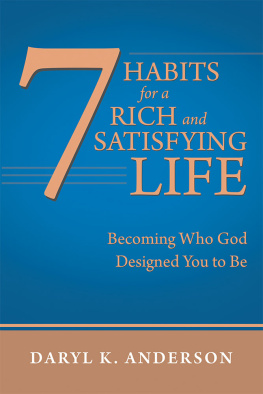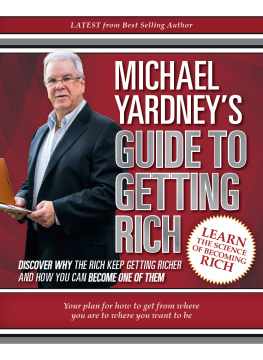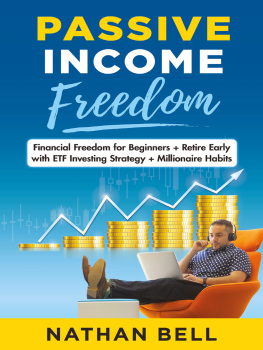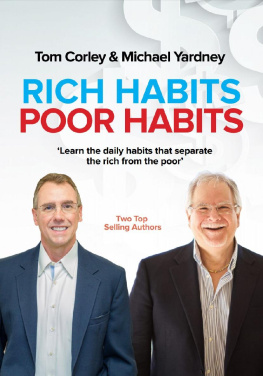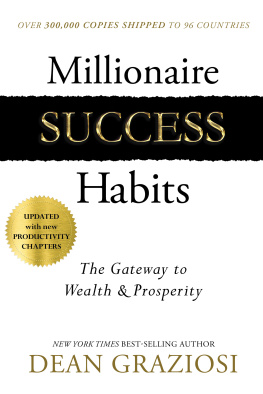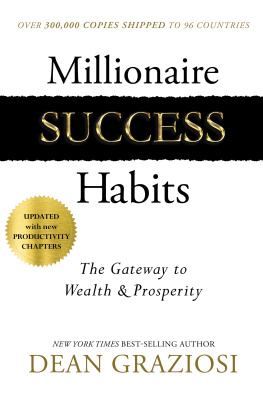Rich Habits, Rich Life
by
Randall Bell, Ph.D
EBOOK EDITION
ISBN: 978-0-692-47184-5
Copyright 2016 Leadership Institute Press
Leadership Institute Press
Laguna Beach, California
www.richabits.com
License Notes
All rights reserved. No part of this ebook may be reproduced in any form or by any means without prior written permission from the publisher except for brief quotations embodied in critical essay, article or review. These articles and/or review must state the correct title and contributing authors of this book by name.
Me We Do Be is a registered trademark of
Randall Bell, PhD
All rights reserved
Leadership Institute Press titles are available at significant quantity discounts when purchased in bulk. Custom printing is also available.
For details contact
Introduction
What is a winning strategy? Why do some people, families, and organizations take a dive, some merely survive, while others thrive? What leads up to a disaster or collapse? Why do some squander success, while others continue to elevate? How do we build a solid foundation that assures solid, authentic growth?
Rich Habits Rich Life is the result of research that has spanned twenty-five years at the intersection of sociology and economics. Specifically, I have explored what behaviors lead to disaster, recovery, or prosperity.
As an economist, I measure the financial effects caused by disasters and other detrimental conditions. In other words, when disaster strikes, I am often called in to compute the business and real estate damages. Appraisers measure value, but I measure the loss of value. Moreover, also being a sociologist, I keep my eye on the people behind the statistics as I develop the strategies to move forward. It is a narrow consulting niche involving research, valuation, negotiation, and strategy, and it has provided unique access to interesting people and places around the globe.
The journey began in the 1980s when I was a graduate student at UCLA studying leadership and business models. In the 1990s, I directed a national practice at the worlds largest consulting firm. My research expanded as I walked the reactors at Chernobyl and cut through the jungles around the Bikini Atoll radioactive nuclear test sites. I have worked on cases ranging from the O. J. Simpson and JonBent Ramsey crime scenes to the bizarre Heavens Gate Cult mass-suicide mansion.
In the 2000s, there was more. I was stunned as I stood on a curb in New York and watched smoke billowing from the World Trade Center and picked up debris on a rural field in Pennsylvania where Flight 93 had crashed on 9-11. I walked the beaches stained by the BP Oil Spill and inspected thousands of homes torn apart by Hurricane Katrina.
As a socio-economist I have worked on these and hundreds of other cases around the world. More importantly, I have studied their ultimate resolution. While some reporters drop in and rush off to the next story, I have stayed to talk to the people long after the news vans drive away. Furthermore, I have been an advisor in countless boardrooms where we discussed cases involving billions of dollars.
A crisis exposes a persons or organizations true character, and this yields some invaluable insights. In all, I had accumulated a mountain of information and I wanted to organize it within a practical framework. My objective was to find a model that children could understand and that a CEO would take seriously. I considered using the ancient Greek paradigm of ethos, pathos, and logos and a more modern framework of mental, social, spiritual, and physical. Of course, there was the standard, mind, body, and soul as well as many other models.
All of these struck me as good, but none of them struck me as complete. It was as if they were playing some of the keys of the piano, but not the whole keyboard. I simply wanted a clear, complete framework.
My quest for the ideal model ultimately came to me on the Marianas Islands as I sat in deep thought for three consecutive days. The answer was simple: Just as all great structures have four cornerstones, there are four cornerstones of all great pursuits. These can be summed up as Me We Do Be.
Me refers to habits that build quality thinking and wisdom, We habits build relationships, Do habits build productivity, and Be habits build the future.
In the pages that follow, I will use this Me We Do Be framework as we explore some of the most fascinating places on Earth, learn from the experiences of some extraordinary people, and look at classic behavioral research. This is all set out within the four Me We Do Be sections, twenty-one short chapters, and about one hundred individual lessons. The objective of each lesson is to encourage discussion on essential life skills.
On top of that, more than five thousand people from all fifty states, Australia, and the United Kingdom participated in our Rich Habits survey. Here, my research staff and I surveyed professionals, students, stay-at-home moms, retirees, the unemployed, and multi-millionaires. We studied dozens of rituals ranging from writing thank-you notes to eating together as a family. We then statistically correlated various habits with different measures of success such as education, wealth, quality relationships, and an overall sense of happiness.
Obviously, some people define success as making money. I joke that money doesnt make anyone happy, but its a great way to be miserable! However, some might define success as a happy family life, finding true love, or winning a competition. Some see success as contributing to a worthy cause, completing a degree, or mastering a musical instrument. Others view success as healing from an emotional wound, beating cancer, or connecting with the divine. Some see success as being a leader or building a huge name for themselves, while others just want the satisfaction of quietly doing great work. Many define success as a combination of things.
I respect the perception that there is no one-size-fits-all for success. Here, we define what success means to us individually, but in so doing, we will look at the foundational elements that apply to us all.
The research and science is clear: however you define success, daily habits, rituals, and routines is the key to either tragedy or triumph. Just as one bad habit rippling out until a life is destroyed, it is also true that one new good habit can ripple out and create something magnificent.
Todays habits, rituals, and routines are tomorrows destiny, and minor adjustments bring major rewards. Indeed, the four cornerstones of Me We Do Be lay the foundation of every great pursuit. They bring results that are positive, profound, and permanent
Chapter 1 The Four Cornerstones
Me We Do Be
The worlds majestic structures stand as legacies to great empires and civilizations. The medieval castles of Europe, Roman cities, and the Great Wall of China still awe and inspire. The ancient city of Machu Pichu and the Egyptian pyramids are simply baffling. Even the obscure British scientific outposts in Antarctica are impressive as they withstand the harshest winters on planet Earth.
While the great structures include pyramids, cathedrals, towers, and opera houses, they all have one thing in common: The integrity of all these structures comes down to one elementall of the worlds great structures sit on a solid foundation.
Not every structure has met this requirement, and cutting corners is disastrous. Indeed, the quality of a buildings foundation means the difference between a trophy or a tear down.
Nobody really knows the origins of the term fair and square, but I believe that it came from the construction of the cornerstones of historys great buildings. Fair refers to rockthat it is free of cracks. Square means that the stone is perfectly cut to be level and that the corners are at right angles.
Next page
